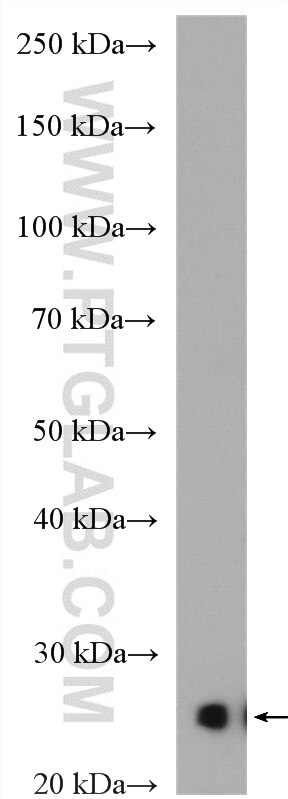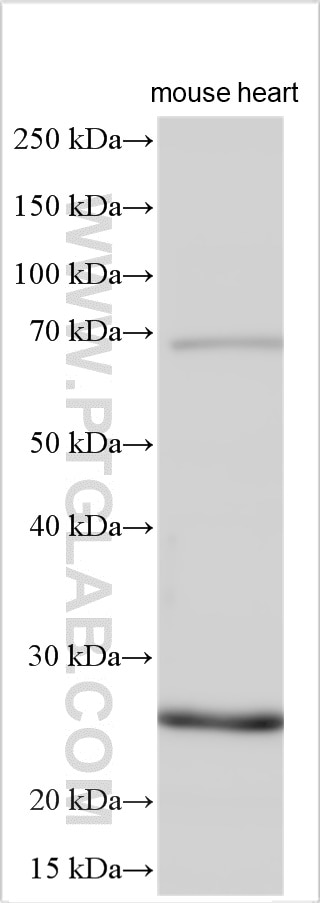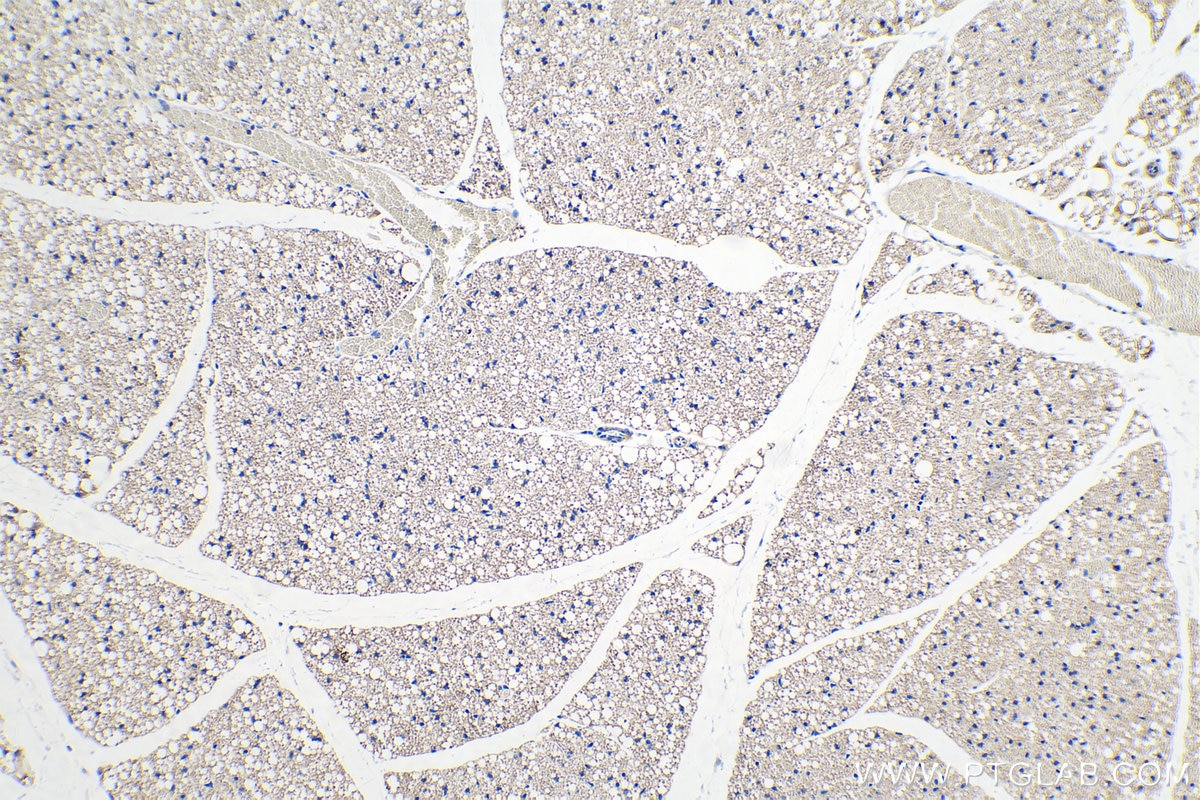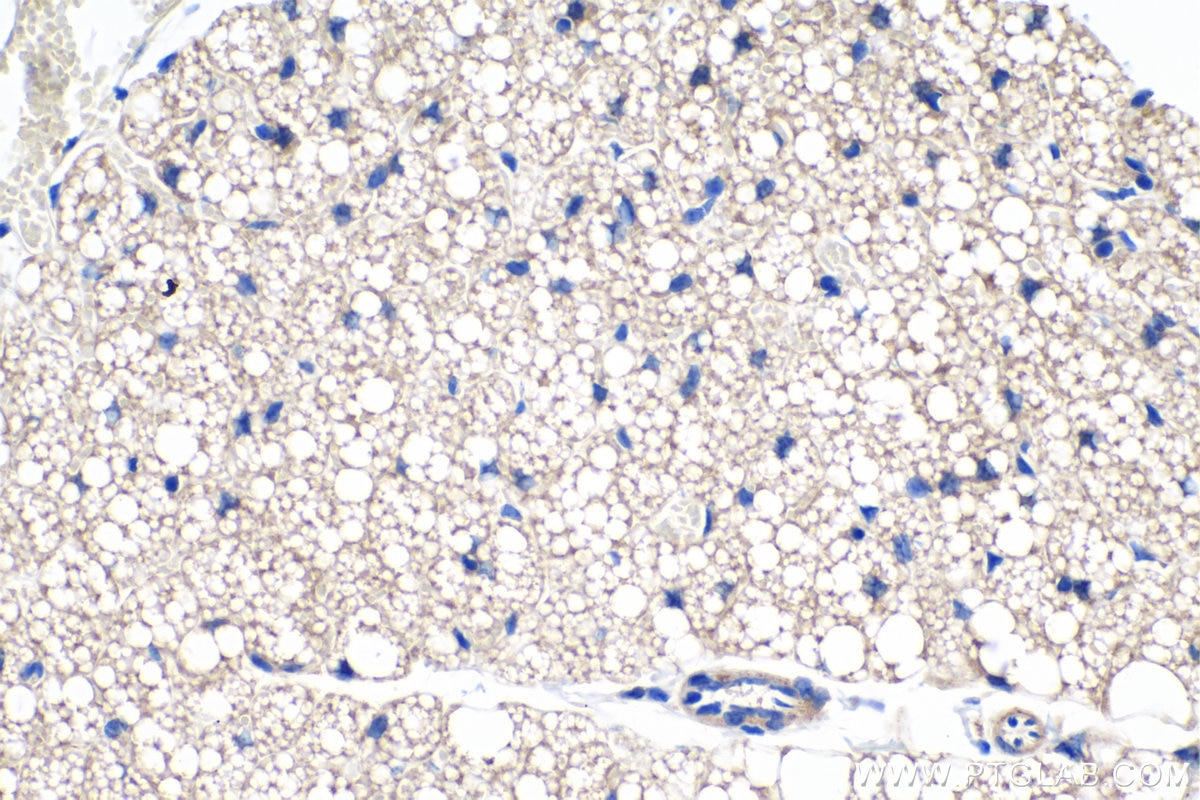Anticorps Polyclonal de lapin anti-CIDEA
CIDEA Polyclonal Antibody for WB, IHC, ELISA
Hôte / Isotype
Lapin / IgG
Réactivité testée
Humain, rat, souris
Applications
WB, IF, IHC, ELISA
Conjugaison
Non conjugué
N° de cat : 13170-1-AP
Synonymes
Galerie de données de validation
Applications testées
| Résultats positifs en WB | tissu cardiaque de souris, |
| Résultats positifs en IHC | tissu adipeux brun de souris, il est suggéré de démasquer l'antigène avec un tampon de TE buffer pH 9.0; (*) À défaut, 'le démasquage de l'antigène peut être 'effectué avec un tampon citrate pH 6,0. |
Dilution recommandée
| Application | Dilution |
|---|---|
| Western Blot (WB) | WB : 1:500-1:2000 |
| Immunohistochimie (IHC) | IHC : 1:500-1:2000 |
| It is recommended that this reagent should be titrated in each testing system to obtain optimal results. | |
| Sample-dependent, check data in validation data gallery | |
Applications publiées
| WB | See 15 publications below |
| IHC | See 3 publications below |
| IF | See 1 publications below |
Informations sur le produit
13170-1-AP cible CIDEA dans les applications de WB, IF, IHC, ELISA et montre une réactivité avec des échantillons Humain, rat, souris
| Réactivité | Humain, rat, souris |
| Réactivité citée | rat, Humain, souris |
| Hôte / Isotype | Lapin / IgG |
| Clonalité | Polyclonal |
| Type | Anticorps |
| Immunogène | CIDEA Protéine recombinante Ag3824 |
| Nom complet | cell death-inducing DFFA-like effector a |
| Masse moléculaire calculée | 253 aa, 28 kDa |
| Poids moléculaire observé | 25 kDa |
| Numéro d’acquisition GenBank | BC031896 |
| Symbole du gène | CIDEA |
| Identification du gène (NCBI) | 1149 |
| Conjugaison | Non conjugué |
| Forme | Liquide |
| Méthode de purification | Purification par affinité contre l'antigène |
| Tampon de stockage | PBS avec azoture de sodium à 0,02 % et glycérol à 50 % pH 7,3 |
| Conditions de stockage | Stocker à -20°C. Stable pendant un an après l'expédition. L'aliquotage n'est pas nécessaire pour le stockage à -20oC Les 20ul contiennent 0,1% de BSA. |
Informations générales
Cell death-inducing DNA fragmentation factor (DFFA)-like effector (CIDE) family proteins, including Cidea, Cideb, and Fsp27 (Cidec), are lipid droplet (LD)-associated proteins playing important roles in LD fusion, lipid secretion, and very-low-density-lipoprotein (VLDL) maturation. Cidea is highly enriched in adult brown adipose tissue (BAT), and its deficiency results in the accumulation of smaller LDs in brown adipocytes, improved INS sensitivity, and resistance to diet-induced obesity. The MW of this protein is 25 kDa, and this antibody specially recognises the 25 kDa protein.
Protocole
| Product Specific Protocols | |
|---|---|
| WB protocol for CIDEA antibody 13170-1-AP | Download protocol |
| IHC protocol for CIDEA antibody 13170-1-AP | Download protocol |
| Standard Protocols | |
|---|---|
| Click here to view our Standard Protocols |
Publications
| Species | Application | Title |
|---|---|---|
Nat Commun Dynamic enlargement and mobilization of lipid droplets in pluripotent cells coordinate morphogenesis during mouse peri-implantation development. | ||
EMBO J Asparagine reinforces mTORC1 signaling to boost thermogenesis and glycolysis in adipose tissues. | ||
Diabetes Fat-Specific Knockout of Mecp2 Upregulates Slpi to Reduce Obesity by Enhancing Browning. | ||
J Agric Food Chem Polysaccharide from Ziyang Selenium-Enriched Green Tea Prevents Obesity and Promotes Adipose Thermogenesis via Modulating the Gut Microbiota | ||
Food Funct Artemisia sphaerocephala Krasch polysaccharide promotes adipose thermogenesis and decreases obesity by shaping the gut microbiota |





